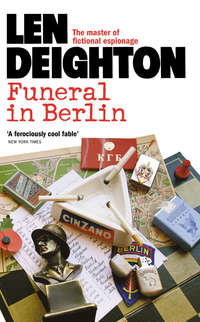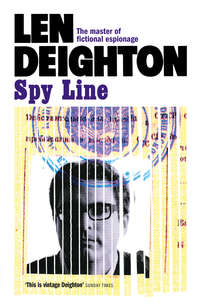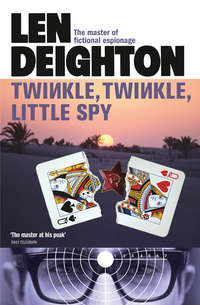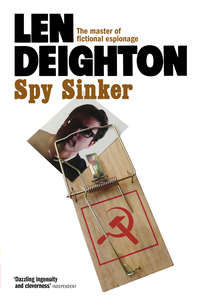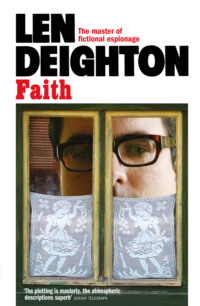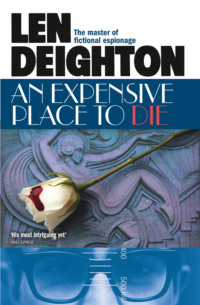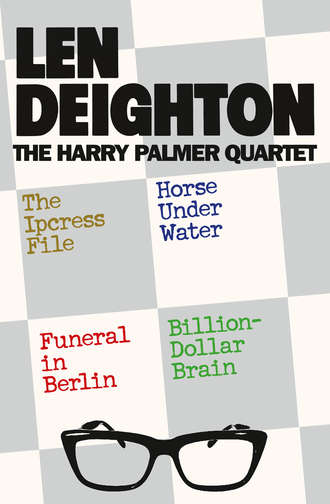
Полная версия
The Harry Palmer Quartet
Half-way down the driveway I realized that between now and tomorrow morning was ample time to get myself arrested on a murder charge. Perhaps I should go back and say, ‘Oh, there’s one other thing. I’m wanted for murder.’
I started up the Austin, and moved easily down the road towards the big pub. It was about a quarter of a mile down the road before Waterman switched on his lights. He kept going up in my estimation. When we got to the car park of the ‘Glowering Owl’, I walked across to Waterman and gave him the money in cash.
‘It went off all right then. I’m glad of that,’ he said, his nicotine-stained moustache following his mouth as it smiled. I thanked him, and he put his car into gear, then said, ‘I thought we were in for a right barny when the big Chink feller came out to look at you through the window.’
Big rain clouds raced across the moon, and an arty-looking couple came out of the Saloon Bar, arguing violently. They walked across the car park.
‘Wait a minute,’ I said, my hand on the edge of the wet car window. ‘Chink? A Chinese? Are you sure?’
‘Am I sure? Listen, friend. I had five years in the New Territories; I should know what a Chink looks like.’
I got into the car seat beside him, and asked him to go through it in slow motion. He did so, but he needn’t have done for all the extra information it gave me.
‘We are going back up there right away,’ I told him.
‘Not me, friend, I did the job I was hired for.’
‘OK,’ I said, ‘I’ll pay you again.’
‘Look friend, you’ve been there, you’ve had your say – let things be.’
‘No, I must go back up there whether you come or not. I might only glance in through the window,’ I coaxed.
‘This is nothing to do with your wife, friend. You’re up to some no-good. I can tell. I could tell you weren’t a divorce case from the first minute I saw you.’
‘All right,’ I said, ‘but my money’s OK isn’t it?’ I didn’t pause, as I considered his disagreement on this score very unlikely. ‘I’m from Brighton – Special Branch,’ I improvised, and showed him my forged warrant card. It passed in the poor light inside the car, but I’d hate to depend upon it in daylight.
‘You a copper! You never are, friend.’
I persisted that I was, and he half-believed me. He said, ‘I know that some of the new coppers you can hardly tell nowadays. Real mixture they are.’
‘This is an important case,’ I told him. ‘And I want your assistance now.’
The squeelch and buzz of the windscreen wipers continued steadily as he made up his mind. Why did I want him? I thought; but somewhere I had a hunch it would be a good eight guineas’ worth. It wasn’t one of my best hunches.
‘Why didn’t you bring one of your own constables?’ he suddenly asked.
‘It wasn’t possible,’ I said, hesitating. ‘It’s out of our area. I’m acting on special authority.’
‘It’s not monkey business, friend, is it? I couldn’t be mixed up in anything funny.’
At last. At last I was getting it across to him that I was a policeman negotiating a high-class bribe. As he got used to it, he came to quite like the idea of a well-placed friend on the force, but he added, ‘It will cost you another twelve guineas.’
We settled on the fee and set off up the road again, this time both in his car. I didn’t want Dalby to see the blue Austin 7 coming back again. The files were the problem. I didn’t know what to tell Waterman to do with them if anything happened, so I put them on the back seat and hoped that nothing would.
1 United States Medical Department.
2 It was a difficult problem which before the Castro régime had always been handled by a small private bank in Havana, which we more or less owned. Castro, however, had nationalized it, luckily not before the local police had tipped them off, so the documentation was at present intact at Saratoga Springs. Dalby asked me to submit a report about it. This was the sort of situation that I was always called in to help with. Not that I’m any sort of accountant, goodness knows; I can make two and two into something different every time I put those particularly unreliable digits together, but I had done a lot of work with the Swiss bank for Ross. By the time I came to Dalby’s department, I had enough good solid contacts there to trace any secret account, given enough time. As well as this I had learned every legal and illegal way of moving money about the globe. Money is to espionage what petrol is to a motor-car, and it was because I had kept the wraps on my contacts there that I had been so insubordinate to so many for so long.
29
It all worked quite smoothly: approach without lights, parking, and the walk to the house. It was quite dark now, but gaps in the curtains let some light fall across the flower beds. Perhaps those were the chinks Waterman saw, I thought. I was getting quite skilled at negotiating growing plants on foot at night. Without making too much noise on the gravel I got close to the window of the room in which I had spoken with Dalby. It was a bit shattering to find Dalby was very close to the window on the other side; like a picture on a 21-inch screen. He wasn’t, however, concerned with prowlers in his garden; he was pouring a drink from that damn’ cabinet. On the sofa sat Murray listening to Dalby as he poured and talked. They were talking to someone else outside my range of vision; he must have asked what they wanted to drink because the third party walked across to the drinks cabinet. I watched them only three feet away from me. I could catch an occasional word of conversation even through the double glass. My hunch was right; there was no other face like K.K.’s, and every feature was inscribed on my retina. He was Waterman’s ‘Chink’. K.K. and Dalby. I had seen enough and was about to go – but Dalby and K.K. were both looking across the room speaking to another. It wasn’t Murray, I’d seen him go into the kitchen. And then into my line of vision – like the bad fairy at the princess’s christening – walked Jay.
I almost fell backwards into the Convallaria. After all those hours of screenings, there could be no mistake. The elusive Jay. Few members of the department had ever seen him, and yet I was always coming across him – in Led’s, in the street, in theatre clubs, and now – finally the prince of evil is chatting with the head of the department. How can I tell you the impact this made on me? It was like seeing Mr Macmillan drop a CP1 card out of his wallet; it was like discovering that Edgar Hoover was Lucky Luciano in disguise. I was watching the scene like a small boy in a lollipop factory. Goodness knows how long I stood petrified with surprise. K.K.’s presence shattered me, but Jay’s made me forget K.K.! ‘We are moving in from opposite ends to the same conclusion,’ Dalby had once told me. How wrong can you get? I remembered the two men I had seen from the Terrazza Restaurant window. Undoubtedly they were Jay and Dalby.
Waterman had followed me up the path, and I reached out my hand to help him avoid the lily of the valley. After staring wide-eyed into the bright room, the darkness was a baffling blanket of void, out of which a hand smelling of toilet soap clamped across my mouth, and something very sharp penetrated the ‘one-piece back’ of my jacket. I stiffened and held very still.
‘It’s Murray, sir,’ a voice in my ear said, and I thought, ‘Sir? This is a nice time for formalities.’
I remembered Raven who we’d kidnapped near the Syrian border, and how puzzled I’d been to hear Dalby say, ‘I’m sorry, sir,’ when he injected him. Perhaps ‘Sir’ was something they always say when they – what were Dalby’s words – ‘bumped you off’.
‘I’m taking my hand away now, sir. Don’t shout or we’ve both had it.’ I nodded my head but Murray mistook it for an attempt to escape, and he instinctively twisted my arm and held my mouth even tighter. Where the hell was Waterman? Come and earn your twelve guineas I kept thinking – but there was no sign of him. Murray eased me quietly away from the house, and finally let go of me altogether. He was the first to speak.
‘You were walking all over the infra-red alarms.’
‘I might have guessed it wasn’t as wide open as it looks,’ I said.
‘I’ve got to get back to the house now, but …’ he hesitated. There was plenty I wanted to know. I was in no position to extract a confession, but I leaned towards him and said, ‘Listen, Murray, whatever screwy damn’ thing is going on, you know that all the people in that house are actionable under the Treason Act. You will act on my orders and mine only as of this moment, or you will become an enemy of HMG.’2 Murray was silent. ‘Can’t you see, man? Dalby has sold out, or perhaps he’s been a double agent for years. My task was to verify that information. I have five provost platoons in Haslemere – whatever happens the whole show is over. I’m giving you a chance, Murray, because I know you are not in as deeply as the others. Come with me now and help me assemble my data. The whole crowd of them are done for.’ I stopped; my invention had flagged: I was on the verge of saying the game’s up.
‘My name’s Harriman,’ said Murray. ‘And I’m a lieutenant-colonel in Special Field Intelligence, and it’s you who must be temporarily subject to my orders.’ His voice was different to that of the Sergeant Murray I had known. He went on. ‘I’m sorry you’ve had such a bad time, but you must get out of here now. We are not out of the proverbial wood by any means. To get Dalby is nothing …’ That was the moment when Waterman hit him with the spanner.
I looked down at Murray or Harriman or whoever he was and I knew quite clearly what I must do. I must get out of here. What Dalby & Co would do when they found their unconscious friend with his head in the petunias was anyone’s guess. Waterman, that soul of simplicity, was now bound to me by complicity in my actions. ‘Did I do right, Super?’ he said about three times. I told him that he was sensational, but it was difficult to sound enthusiastic. It was something though, that he was prepared to do as I told him. We dragged Murray’s body into the taller flowers.
I was prepared to have to sit in Waterman’s car for a couple of hours, but within ten minutes we saw the front door open and car headlights switched on. It was a large car, and as it came steadily down the drive the headlights skimmed across the prostrate Murray. We both held our breath, but I suppose we saw it only because we knew it was there. Dalby went inside, and the big Rolls turned on to the road and headed towards London.
‘Catch that up,’ I told Waterman. ‘I want to see the driver.’
At Milford the street lighting gave me a chance to take a look at the car. It was a black Rolls Phantom IV, a straight-eight that Messrs Rolls-Royce will only sell to Royalty and Heads of State. How typical that Jay should have one. Waterman flipped open the glove compartment and produced a pair of prismatics. With them I could see Jay as he leaned back on fine West of England upholstery and sipped a drink from the cocktail cabinet. Now and again I could glimpse the chauffeur’s face in the green-tinted mirrors. We had settled down to a steady forty-five now. Waterman was a driver in a million. He handled his car with a curious ‘finger-tip’ feeling that was alien to him, because out of the car he was a clumsy, heavy-handed clod of a fellow. It was important that the Rolls didn’t know it had a tail, and Waterman hit upon the rather subtle ruse of trying to race it, but always losing out. The Rolls didn’t take advantage of its superior power to race ahead as at first I feared it might. Not that it would have shaken us off. Waterman’s little modified double-carburettor car was his pride and joy. It had dozens of instruments, temperature gauges, revolution counters, clocks and reading lights. But we kept going at forty-five all the way to London. Jay seemed to be in no sort of hurry.
1Communist Party.
2Her Majesty’s Government.
30
[Aquarius (Jan 20–Feb 19) A good week for your hobbies and romance, but you can expect some difficulties with evening arrangements. Forthright talking may clear the air.]
Jay’s Rolls purred along the Cromwell Road until it turned off near the Brompton Oratory. Those gaunt Victorian houses, built at the time of the 1851 Exhibition, stared down at us. Cars were parked densely along the pavements, sports cars and snob cars and cars wrapped in silvery sheets of material. We turned off the road when Jay rolled to a standstill outside a big conversion. We closed the doors quietly and moved quickly enough to see the portly form of Jay entering the front door. It was a ‘tasteful’ piece of contemporary; natural wood-finish doors, stainless-steel windows and venetian blinds everywhere. Waterman and I peered at the list of names and bell pushes.
‘You may as well go in,’ said a tall, bespectacled city gent behind us, opening the door with a key. We went in, partly because it was convenient for us, partly because there were two more city gents behind us, and partly because they were all holding small 9mm Italian Mod 34 Beretta automatic pistols.
The man who had spoken pushed the top bell and spoke into the small metal microphone. ‘Yes. There’s two of them. One of them could be a policeman,’ he said. They had been tailing us, and to add insult to injury had been discussing us over car to car radio-phones.
I then heard Jay’s voice, ‘Put the gentlemen on the detector and bring them in, Maurice.’ I looked at Waterman – the edges of his stained moustache turned down: we’d been a couple of right ninnies. Followed all the way! I should have guessed that Jay meeting Dalby would take some ‘beef’ with him. I wondered if Dalby had phoned Jay about Murray: found unconscious in his flowers.
The entrance hall was all black mirrors, fresh flowers and genuine cut-glass chandeliers. We were stood up before the full-length mirror. There was a small buzzing noise and I was deprived of my gun by Maurice who stood well clear of his colleague’s line of fire. Maurice was very professional. If you could afford a Phantom IV you could afford the best in hoodlums. We were taken upstairs.
The forty-foot living-room was ankle deep in cream-coloured long-tufted carpeting. The white walls were punctuated with large abstract paintings: Rothko, Motherwell and Hitchens. At the far end of the room a circular black-marble table of knee height, surrounded by low black-leather armchairs with high wing backs, made a cosy corner round the gigantic hi-fi unit, and TV that was telling us that ‘Trill makes budgies bounce with health’ over and over again.
At ‘our’ end of the room Jay’s voice, a rather rich detergent-advertising voice, floated through the open doorway. ‘Won’t you sit down?’
The three city gents withdrew like the Beverley Sisters taking a curtain, but we all knew they were no farther than the thickness of the door away.
‘This is Mr Waterman,’ I said loudly to the invisible Jay, ‘of Waterman’s Detective Agency. I hired him this afternoon.’ There was only silence so I spoke again even more loudly, clearly enunciating my words as one would speak to a rich deaf uncle. ‘I don’t think there is anything further from Mr Waterman. He may as well go home now.’
There was silence, then Jay’s voice, ‘Do you owe Mr Waterman any money?’
‘Fifteen guineas,’ I said, ‘but I thought you would want to fix it.’
Jay must have pressed a button for I heard a soft buzzer. The door opened so quickly that Maurice must have been standing with his hand on the handle.
‘What kept you, Maurice?’ I said. I hated Maurice; he was so polite and restrained. He stood there without speaking. His spectacles were clean and efficient – the glass emphasized the deadly little eyes through which he dispassionately viewed his world, of which I was, for the time being, a part. Again came Jay’s instruction. ‘Maurice, you will let Mr Waterman here have a cheque for fifteen guineas. The number three account, Maurice. Then you will show Mr Waterman to the door.’ Maurice nodded even though Jay couldn’t see him.
Mr Waterman was pinching large sections of his nicotine-stained little moustache between index finger and thumb, and twisting it until it pained him. Mr Waterman also nodded. Mr Waterman must go. Mr Waterman was feeling a little out of place. Money is money but even at fifteen guineas a time he felt he must go. ‘Good-bye Mr Waterman,’ I said, and Mr Waterman left us.
I wanted to see what Jay was doing in the little annexe without a door. I could hear him moving around. I knew these big Kensington houses; visitors just never participate. I walked across to the doorway. I don’t know what I expected to see Jay doing. Sitting in front of bubbling test tubes like a Bela Lugosi movie. Watching ‘This is your Life’, or perhaps cultivating hot-house orchids.
‘You are interested in cooking?’ Jay looked much older than I remembered him, and against the white cook’s apron, strapped over one shoulder in the French manner, his complexion was rubicund as is a heavy drinker’s. In his hand he held a three-pound lobster. The kitchen was illuminated by merciless daylight tubes. Copper, stainless steel and sharp knives were distributed with the careful forethought of an operating theatre. A kitchen with such a maze of scientific aids that would make Cape Canaveral look like a rectangular wheel. Jay put the fresh mottled black and verdigris lobster down on the white counter and picked a bottle of Moet & Chandon out of the ice bucket with a happy tinkle. He poured two generous glasses full.
‘I could get interested,’ I said.
‘That’s right,’ said Jay, and I began to drink the cool clear bubbling drink.
I said, ‘Didn’t Lao-Tze say something like “Govern the Empire as you would cook a little fish”?’
Jay warmed to me. A smile peeped around his giant moustache. ‘Montaigne said, “Great men pride themselves on knowing how to prepare a fish for table,”’ he answered.
‘But did he mean it as a compliment?’ I asked.
Jay didn’t answer; he was driving a long metal rod through the lobster. I sipped the cold champagne.
‘It’s quite dead,’ said Jay. I could see it was a difficult job. ‘I just can’t bear killing things,’ he told me. He’d finished getting the lobster on the spit. ‘You know, I have to get the fish merchant to kill it for me.’
‘Yes,’ I said. ‘Some people are like that, I know.’
‘A little more champagne,’ he said. ‘I only need half a bottle for this recipe, and I don’t like to drink too much.’
‘Thanks,’ I said, and I meant it. It was hot in that kitchen.
He poured the remainder of the bottle into a metal tray and threw a little salt into it. ‘You’re a cool young man,’ he said. ‘Don’t you care about your friend Cavendish?’ He added a large piece of butter to the champagne. I don’t know why, but I didn’t expect that the butter would float. I remember watching and thinking ‘It only does that because Jay put it in.’ I sipped my champagne again.
Jay picked up his champagne and drank some – he watched me intently through his tiny little eyes. ‘I run a very big business.’
‘Yes, I know,’ I said, but Jay waved his big red hand.
‘Bigger,’ he said. ‘Bigger than you know.’ I said nothing. Jay had a jar down from the shelf and sprinkled a few peppercorns into the champagne. He carefully carried the tray and limping across the tiny kitchen clipped it into the radiant heat vertical grill. He picked up the lobster that he couldn’t bear to kill and waved it at me.
‘The fishmonger sells fish. Right?’ he said, and fixed it to the grill. ‘The wine merchant sells champagne. The French don’t protest at the idea of their champagne leaving France. Right?’
‘Right,’ I said. I was beginning to recognize my cue.
‘You.’ I wondered what I sold. Jay switched on the grill and the lobster, lit bright red on one side by the electric element, began to revolve very very slowly. ‘You,’ said Jay again, ‘sell loyalty.’ He stared at me. ‘I don’t do that: I wouldn’t do it.’ For a moment I thought even Jay thinks I have changed sides, but I realized that it was Jay’s way of talking. He went on, ‘I sell people.’
‘Like Eichmann?’ I asked.
‘I don’t like that sort of joke,’ said Jay like a Sunday-school teacher at the Folies Bergères. Then his face cracked into a little grin. ‘More like Eichelhauer let’s say.’ That was the German name for Jay. Jay, I thought. Garrulus glandarius rufitergum. Jay: egg thief, bully of birds and raider of crops, lurking, cautious Jay who flies in clumsy undulating hops. ‘I deal in talented men exchanging employment of their own free will.’
‘You’re a talent scout from the Kremlin?’ I said.
Jay began to baste the lobster that he didn’t like to kill with the champagne that he didn’t like to drink. He was thinking about what I said. I could see why Jay was such a big success. He took everything at its face value. I still don’t know if Jay thought he was a talent scout from the Kremlin because the wall phone rang in the kitchen. Jay stopped basting long enough to wipe his hands. He listened on the phone. ‘Put him through.’ A pause. ‘Then say I am at home.’ He moved round and fixed me with that basilisk’s stare that people holding phones have. He suddenly said to me, ‘We don’t smoke in the kitchen,’ then, uncupping the phone, ‘This is Maximilian speaking. My dear Henry.’ His face split open in a big smile. ‘I won’t say a word, my dear friend, just carry on. Yes, very well.’ I saw Jay push the ‘scramble’ button. Jay just listened, but his face was like Gielgud doing ‘The Seven Ages of Man’. Finally Jay said, ‘Thanks,’ and he hung up the phone thoughtfully, and began to baste the lobster again.
I puffed my cigarette. Jay watched me but said nothing. I decided the initiative in this conversation had passed to me. ‘Is it time to talk about the head-shrinking factory at Wood Green?’ I asked.
‘Head shrinking?’ Jay asked.
‘Brain Washing Incorporated: the place I jumped out of. Isn’t that what we’re leading up to?’
‘You think that I’m something to do with that?’ his face was 11 A.M. November 11th.
There was a knock on the door and Maurice brought a slip of paper to Jay. I tried to read it, but it was impossible. There may have been about fifty typewritten words there. Maurice left. Then I followed Jay across the big sitting-room. Near the radio and TV was a small machine like a typewriter carriage. It was a paper shredder. Jay fed the sheet in and pressed a button. It disappeared. Jay sat down.
‘Did they treat you badly at Wood Green?’ he said.
‘I was getting to like it,’ I said, ‘but I just couldn’t keep the payments up.’
‘You think it’s terrible.’ It was neither a question nor a statement.
‘I don’t think about it. I get paid to encounter all manner of things. I suppose some of them are terrible.’
‘In the Middle Ages,’ Jay went on as though he hadn’t heard, ‘they thought the cross-bow was the most terrible thing.’
‘That wasn’t because of the weapon itself, but because it threatened their system.’
‘That’s right,’ Jay said. ‘So we let them use the terrible weapon, but only upon Moslems. Right?’
‘That’s right,’ I said; now I was using his lines.
‘What you might call a policy of limited war upon subversive elements,’ Jay told me. ‘Yes, and now we have another terrible weapon; more terrible than nuclear explosions, more terrible than nerve gas, more terrible than the anti-matter bomb. But with this terrible weapon no one gets hurt; is that so terrible?’
‘Weapons aren’t terrible,’ I said. ‘Aeroplanes full of passengers to Paris, bombs full of insecticide, cannons with a man inside at a circus – these aren’t terrible. But a vase of roses in the hands of a man of evil intent is a murder weapon.’
‘My boy,’ said Jay, ‘if brain-washing had come to the world before the trial of Joan of Arc she would have lived to a happy old age.’
I said, ‘Yes, and France would still be full of mercenary soldiers.’
‘I thought you’d like that,’ said Jay. ‘You’re the English patriot.’
I was silent. Jay leaned forward from where he was sitting in the big black-leather armchair. ‘You can’t really believe that the Communist countries are going to collapse, and that this strange capitalist system will march proudly on.’ He tapped my knee. ‘We are both sensible, objective men, with, I think I might say, wide political experience. Neither of us could deny the comfort of it all,’ he stroked the rich leather, ‘but what has capitalism to offer? Its colonies that once were the goose that laid the golden egg, they are vanishing. The goose has found out where to sell the egg. The few places where a reactionary government has suppressed the socialist movement, why, in those places those governments are merely propped up by Fascist force, paid for in Western gold.’


